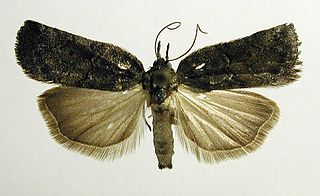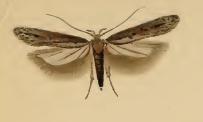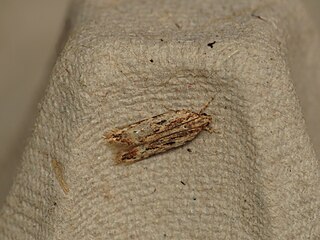
Ixias pyrene, the yellow orange tip, is a small butterfly of the family Pieridae, that is, the yellows and whites, which is found in Sri Lanka, India and southeast Asia.
Apocritica is a genus of moth in the family Gelechiidae. There is only one species in this genus, Apocritica chromatica, that is found on the Seychelles.
Oestomorpha is a genus of moth in the family Gelechiidae. It contains only one species, Oestomorpha alloea, which is found in Mexico.
Xyroptila peltastes is a moth of the family Pterophoridae. It is found in Australia.

Nycteola revayana, the oak nycteoline, is a moth of the family Nolidae. The species was first described by Giovanni Antonio Scopoli in 1772. It is found from Europe and east across the Palearctic to Japan and India.

Oidaematophorus grisescens is a moth of the family Pterophoridae. It is found in North America and Mexico.

Scrobipalpa artemisiella is a moth of the family Gelechiidae. It is found in most of Europe, Turkey and Syria through the Caucasus and Central Asia to Irkutsk and Mongolia. It has also been recorded from North America, but this records requires confirmation.
Gnathifera aphronesa is a moth in the family Epermeniidae. It was described by Edward Meyrick in 1897. It is found in Australia, where it has been recorded from Tasmania.
Arogalea senecta is a moth of the family Gelechiidae. It is found in Mexico (Guerrero).
Ardozyga chenias is a species of moth in the family Gelechiidae. It was described by Edward Meyrick in 1904. It is found in Australia, where it has been recorded from New South Wales and Victoria.

Ardozyga sisyraea is a species of moth in the family Gelechiidae. It was described by Edward Meyrick in 1904. It is found in Australia, where it has been recorded from Victoria.
Scrobipalpa chersophila is a moth in the family Gelechiidae. It was described by Edward Meyrick in 1909. It is found in South Africa.
Scrobipalpa colasta is a moth in the family Gelechiidae. It was described by Edward Meyrick in 1921. It is found in South Africa.
Scrobipalpa incola is a moth in the family Gelechiidae. It was described by Edward Meyrick in 1912. It is found in South Africa and Zimbabwe.
Scrobipalpa pyrrhanthes is a moth in the family Gelechiidae. It was described by Edward Meyrick in 1904. It is found in Australia, where it has been recorded form New South Wales, Western Australia, and Victoria.
Scrobipalpa sibila is a moth in the family Gelechiidae. It was described by Edward Meyrick in 1921. It is found in Mozambique.
Compsolechia sesamodes is a moth of the family Gelechiidae. It was described by Edward Meyrick in 1922. It is found in Brazil and Peru.
Aristotelia dasypoda is a moth of the family Gelechiidae. It was described by Walsingham in 1910. It is found in Mexico (Tabasco) and Jamaica.
Aristotelia squamigera is a moth of the family Gelechiidae. It was described by Walsingham in 1909. It is found in Mexico (Guerrero).
Stenoma comma is a moth of the family Depressariidae. It is found in Cuba, Mexico, El Salvador, Costa Rica, Panama, Venezuela, French Guiana and Guyana.



